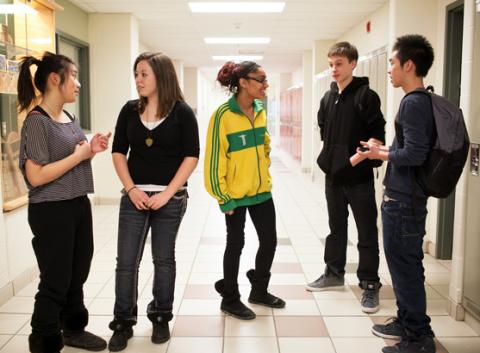
Over the last couple years, Ophea supported a school-based approach to increasing student and teacher understanding of gender-based violence and harassment. The initiative, Campaign Messengers: Taking a Stand!, reached 166 schools, close to 6,000 educators, and over 92,000 students.
Though the initiative has come to an end, the participating schools are still implementing innovative activities and engaging in thoughtful discussions. We chatted with teacher Liana Williams from Milliken Mills High School to learn about the school’s experience with the Campaign Messengers initiative and how her school continues to promote this important topic. Check out our Q&A!
1.Why was the Campaign Messengers initiative important to you as an educator?
The Campaign Messengers initiative was important because it provided direction to my student leaders on our Healthy Schools Committee. The campaign also better prepared me as an educator to share the message about gender-based violence prevention and start the conversation with my peers. We were given an opportunity to learn about a challenging topic, and in turn, are now more knowledgeable and mature; addressing sensitive topics in a more enlightened way.
The Campaign Messengers initiative was important to students in our school because it provided the necessary tools to engage their peers in conversations around gender-based violence prevention and acceptance of all. As a result of the initiative, our student leaders were more confident in discussing sensitive topics and sharing their thoughts and feelings with our entire school community. Our student leaders felt empowered to facilitate change because of Campaign Messengers.
2.What are some Campaign Messengers activities that your school has implemented both during and after the project?
Our school has implemented several Campaign Messengers activities and events. The student leaders set up a smoothie booth where we gave away free smoothies that included positive messages written on the cups, such as “Stay Strong” or “Call For Help”. Student leaders were able to educate their peers while engaging in discussions and personal reflections. Food can bring a community together and we encouraged challenging conversations through our “Smoothie Campaign”.
Another activity that our school implemented was “Milliken Draws the Line”. Our student leaders got t-shirts made with “Milliken Draws the Line” and stood in front of our school to share the message. We also used duct tape to draw a large line up the front steps of our school. Students and staff were handed the scenarios, and asked to write messages on the steps or wall leading into our school. This captured a large portion of our school community as most students and staff enter at the front of the school. Many conversations about violence against women and positive spaces started on our “Milliken Draws the Line” day.
3.What resources did you use in your school?
A resource that was helpful and useful for our school was the Draw-The-Line scenarios from White Ribbon. Because the situations were very real and easy to relate to, our students and staff were able to engage in important conversations. We were able to encourage critical thinking and problem solving to prepare students for the potential of a situation occurring in real life.
4.What impacts and changes are you seeing at your school and with your students?
Overall, students are noticing that the school environment is more inclusive and welcoming. Additionally, there is increased student engagement and our Healthy Schools numbers have increased.
5.What is a challenge you encountered and how did you overcome that challenge?
One major challenge that we encountered throughout the whole process were student’s reaction to challenging topics. Some students were uncomfortable discussing sensitive issues or weren’t prepared to think deeply or critically about the topics that were brought to the forefront. We also learned that some students laugh or act silly in these situations because they don’t have the appropriate tools to manage their reactions. The student leaders found that going back to the Draw-The-Line scenario cards or talking about the 4 Pillars (Respect, Listen, Understand, Communicate) really helped frame the challenging conversations. We still have some work to do related to this challenge but we look forward to continuing our growth.
6.What are your future plans to continue your gender-based violence prevention work in your school?
Since learning so much through Campaign Messengers, we are planning lessons to share with our Grade 9 and 10 Health classes. We feel very strongly that the messages must be shared at a young age and continued throughout high school.
7.What is some advice you would offer to other educators looking to work with this topic?
Advice that we have to offer for future educators looking to work on this topic is to have patience. It is often a topic that isn’t frequently discussed, so people may have inappropriate reactions, thoughts, and comments. Because of that, it is sometimes difficult for people to fully digest the important messages. It is in these challenging moments that we must continue to break down the barriers, empower our peers to support each other, and continue to build healthy schools that are productive, inclusive, and willing to strive for change!
Is your school interested in gender-based violence prevention? While the Campaign Messengers initiative has come to a close, the following resources are available from Ophea and project partners.
